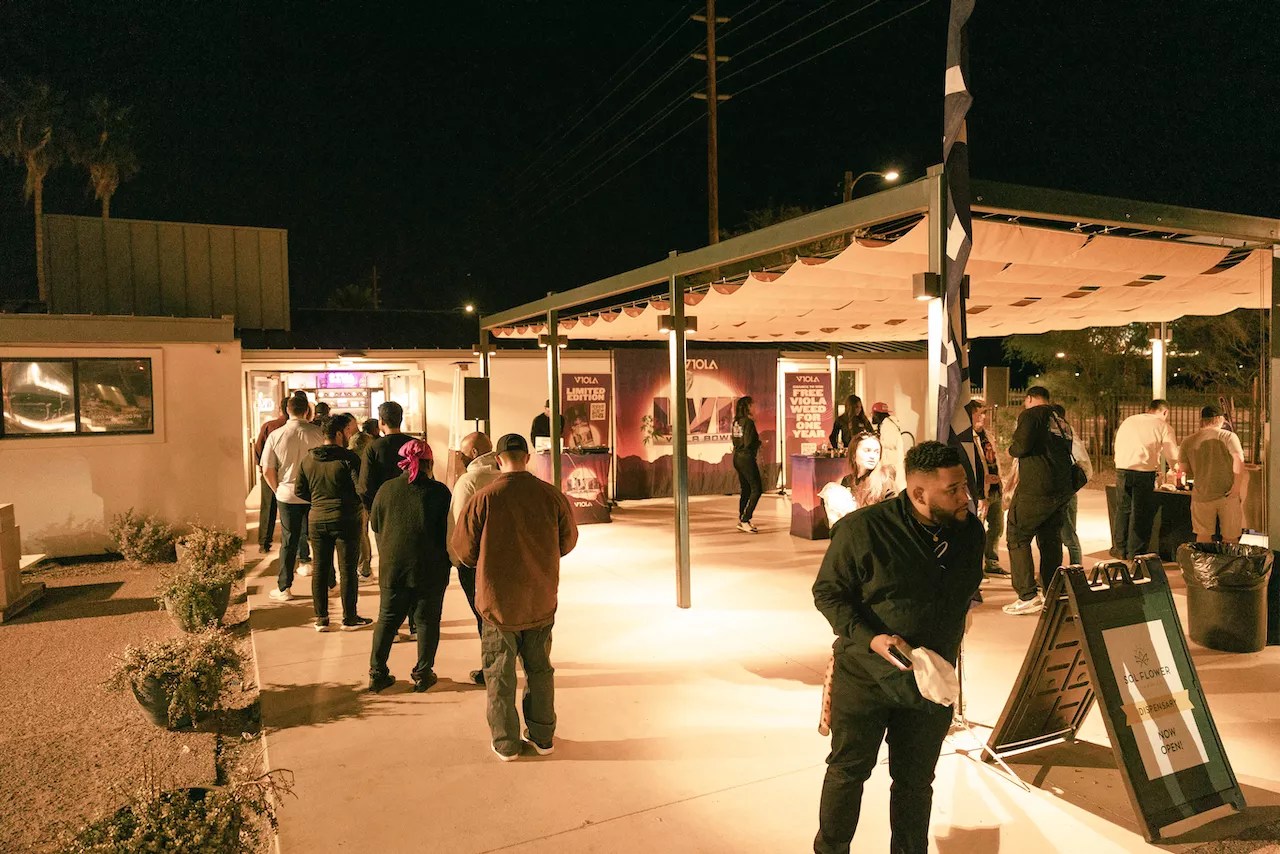
Viola

Audio By Carbonatix
For decades, oppressive laws making cannabis illegal targeted people of color and were tools used to destroy families and communities. Former NBA player Al Harrington wants to change that narrative by creating opportunities for entrepreneurship in marijuana for the people hardest hit by those laws.
Harrington is the CEO and co-founder of Viola, which is based in Los Angeles and Detroit, and expanded to the Valley in February just days ahead of the Super Bowl at State Farm Stadium in Glendale.
“We’ve always had a laser focus approach to use the Viola platforms to uplift and empower people of color,” Harrington told Phoenix New Times. “We want to be represented, have a seat at the table, and use this opportunity to reinvest in our community, communities that were affected,” he said.
On February 10, Viola hosted kick-off events with food trucks, giveaways, and DJs at Sol Flower dispensaries in Tempe and Sun City, and it plans to expand distribution in the state over time. Right now, it’s selling premium flower, pre-rolls, and edibles – including vegan, gluten-free, non-GMO gummies – and might add vapes closer to summer, Harrington said.
Even though convenience items are popular, he added, “We are a flower brand, so we will always offer flower.” Viola has a “broad genetic catalog of both classic and proprietary strains,” according to its website.
The company has a grow partner in Arizona and is starting to focus on brands and innovation. Viola owns a 48,000-square-foot medical cannabis cultivation facility and retail store in Detroit, a 13,000-square-foot facility in Denver, and a 40-acre farm in Oregon. It’s rolling out strategic partnerships in several other states.

Viola products are sold at Sol Flower dispensaries, and the brand hopes to expand its distribution and offerings in Arizona.
Viola
Good Enough for Grandma
The idea for Viola began about 12 years ago when Harrington’s grandmother, 79 at the time, went to see him play as part of the Denver Nuggets. She complained that her eyes hurt from glaucoma, and he suggested she try marijuana.
At first, she resisted, but finally admitted, “I’m in so much pain today, I’ll try anything,” Harrington recalled her saying. When he checked on her later, she was crying and said, “I’m healed. I haven’t been able to read the words in my Bible in three years.”
Harrington’s grandmother used cannabis until she died in late 2022, he said. “Cannabis made the quality of her life better,” Harrington added.
Seeing how much cannabis helped his ailing grandma prompted Harrington to learn more about the industry and decide to get involved. “Here we are 12 years later running this national brand,” he said.
And he still runs the company to his grandmother’s standards. “Any product that we produce, if it’s not good enough for my grandmother, I won’t put it out,” he said. “Our secret sauce is tender loving care that our growers put into our products. We’ve always focused on quality over quantity.”

Customers line up at Sol Flower Dispensary in Tempe on February 10 for the launch of Viola products in Arizona.
Viola
Helping Others Along the Way
The cannabis industry’s patchwork of regulations and high entry price for licenses makes it tough for the average person, and especially people of color, to get a foothold in most markets. Fewer than 3 percent of people of color are owners in the multibillion-dollar cannabis industry across the U.S., according to some sources.
Harrington set up Viola Accelerator, a business incubator, to help others navigate the bureaucracies and learn how to operate cannabis businesses. His goal is to create 100 Black millionaires in the cannabis industry. He’s at 11 so far, and 20 more are in the works, Harrington said.
“One thing I feel I’ve learned, being an NBA player, I’ve always had a lot of opportunity,” he said. “If the opportunity was never presented to me, I never would’ve been able to partake.”
Harrington also set up the Harrington Institute for Cannabis Education in partnership with Cleveland School of Cannabis to help address questions people asked him on social media. It offers online courses – pre-recorded free classes and live instruction for a fee – to teach skills ranging from growing to distribution in order to prepare people to work in the industry. Classes include “Intro to Cannabis Cultivation,” “Cannabis Terpenes and Cultivars,” and “Cannabis Advocacy.”
Harrington also created Viola Cares, which works with national and local organizations on issues including social justice reform, expunging criminal records, and successfully reintroducing formerly incarcerated people into society. He also works on behalf of the company to shape cannabis industry policy.
Although Black and white people use marijuana at roughly the same rate, Black people are arrested for it nearly four times more often.
Harrington said although being a Black man in the cannabis industry carries with it a lot of pressure and responsibility, it’s important to help others along the way. “You can’t put a dollar value on what we mean to the industry and what we mean to people,” he said.